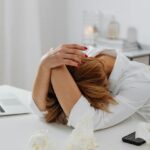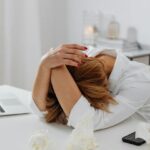Are you experiencing hair loss and feel fatigued? You might be facing the silent struggle of woman low iron levels hair loss. Many women above 30, like you, often feel like they’re carrying the weight of the world. It’s not just about your hair falling out—it’s about how it impacts your confidence and everyday life. Low iron levels can lead to symptoms such as fatigue, anxiety, and even hormonal imbalances, making life feel overwhelming. But don’t lose hope. By addressing this issue, you can regain your energy and vitality.
It’s essential to acknowledge what your body is saying. If you’re feeling the gut-wrenching fatigue that follows you throughout the day, or if your hair seems to be thinning, it could be your iron levels signaling for help. To take action, see here how many women are solving this without heavy medications.
See today's top solution for balance & energy
Gentle guidance trusted by our community.
Table of Contents
Understanding the Connection Between Iron Levels and Hair Health
Many women experience hair loss at different stages of life, and one often overlooked factor is iron deficiency. Iron plays a crucial role in transporting oxygen throughout the body, including to the hair follicles. When iron levels drop, it can result in decreased oxygen supply to hair, leading to thinning and hair loss. This connection is particularly significant for women over 30, who may face various health challenges affecting their iron levels.
Low iron levels contribute to what is known as telogen effluvium, a form of temporary hair loss that can occur after stress, hormonal changes, or significant weight loss. Unfortunately, this form of hair loss can often be dismissed as a mere cosmetic concern, but it reflects deeper issues within the body’s systems.
Signs of Iron Deficiency in Women Over 30
Recognizing the signs of iron deficiency is essential for women, especially as they navigate their 30s and beyond. Some common symptoms include:
- Fatigue: A persistent feeling of tiredness despite adequate rest can signal low iron levels.
- Pale Skin: A noticeable change in skin color, particularly in the face and inner eyelids, may indicate anemia.
- Hair Loss: Increased shedding or thinning hair can be a direct result of insufficient iron.
- Restless Legs Syndrome: An uncontrollable urge to move your legs, especially at night, which can disrupt sleep.
- Shortness of Breath: Even during light activity, a feeling of breathlessness can indicate iron deficiency.
If you notice these symptoms, it may be time to consult with a healthcare professional to evaluate your iron levels.
The Emotional Impact of Hair Loss: More Than Just Appearance
For many women, hair loss is about more than just physical appearance. It can deeply affect self-esteem, leading to feelings of anxiety and depression. The hair is often considered a woman’s crowning glory, and losing it can lead to a crisis of identity.
It’s not uncommon to feel embarrassed or isolated due to hair loss, which can lead to withdrawal from social situations. It’s vital to acknowledge these feelings and understand that you are not alone in your struggle. Many women share this experience, and it’s essential to reach out for support.
Simple Tests to Determine Your Iron Levels
Understanding your iron levels doesn’t have to be complicated. Simple tests can help diagnose iron deficiency:
- Complete Blood Count (CBC): This test checks various components of your blood, including hemoglobin, which can provide insights into your iron levels.
- Serum Ferritin Test: Ferritin is a protein that stores iron in the body. Low ferritin levels indicate low iron stores.
- Iron Studies: A series of tests measuring iron levels, including serum iron, transferrin, and total iron-binding capacity (TIBC).
Discussing these tests with your healthcare provider can lead to a comprehensive understanding of your health.
Dietary Changes to Boost Iron Levels Naturally
Diet can play a significant role in managing iron levels. Consider incorporating more iron-rich foods into your meals:
- Red Meat: One of the most potent sources of heme iron, found in animal products.
- Poultry and Fish: Excellent sources of heme iron that can easily be included in your diet.
- Beans and Lentils: Great sources of non-heme iron, especially for vegetarians.
- Leafy Greens: Spinach and kale provide essential nutrients, including iron.
- Nuts and Seeds: Almonds and pumpkin seeds are good for snacking and boosting iron intake.
Additionally, pairing iron-rich foods with vitamin C can enhance absorption, making your meals even more effective.
Iron Supplements: Are They Right for You?
In some cases, dietary changes alone may not suffice, and iron supplements may be necessary. However, it’s crucial to consult with your doctor before starting any supplement regimen. Self-medicating can lead to iron overload, which poses its own health risks.
Supplement options include:
- Ferrous Sulfate: The most commonly prescribed form of iron supplement.
- Ferrous Fumarate: Another effective option, often recommended for its gentler effect on the stomach.
- Iron Bisglycinate: Known for its high absorption rate and fewer gastrointestinal side effects.
Receiving professional guidance ensures that you take the right dosage and type to support your body effectively.
Lifestyle Adjustments to Combat Fatigue and Hair Loss
Beyond diet and supplements, various lifestyle adjustments can help combat fatigue and hair loss:
- Regular Exercise: Physical activity boosts circulation and can improve hair health while enhancing mood.
- Stress Management: Engage in activities like yoga, meditation, or deep-breathing exercises.
- sufficient Sleep: Prioritize rest to give your body the time it needs to recover and heal.
Making these changes may take time, but your body will thank you for the effort. Everyday actions can lead to significant improvements in how you feel.
Stress and Hormonal Imbalance: The Hidden Drivers
Stress is a quiet yet powerful force in our lives, impacting not only our mental well-being but also our physical health. High-stress levels can lead to hormonal imbalances that contribute to hair loss and fatigue. Cortisol, the stress hormone, can interfere with the growth cycle of hair follicles.
If you find yourself feeling overwhelmed, it’s important to address this aspect of your life. Small, regular practices like gentle exercise or mindful breathing can foster resilience against stress.
Inspiring Stories from Women Who Overcame Hair Loss
Many women face the challenge of hair loss, but many have also discovered effective ways to manage their symptoms and reclaim their confidence. Stories abound of women who took charge of their health through changes in diet, lifestyle, and mental well-being.
Finding a supportive community can also be empowering. Whether through online forums or local groups, sharing experiences and advice can lighten the burden of hair loss.
Creating a Supportive Environment for Your Health Journey
Your environment plays a significant role in your health journey. Surrounding yourself with positivity can influence your mental state and motivate you to make health-conscious choices. Connect with others who understand your situation and encourage each other to share your stories and struggles.
It’s important to remember that seeking help is a strength, not a weakness. If you’ve been struggling with hair loss, fatigue, or any related symptoms, know that it’s okay to ask for help. You are not alone on this journey.
Many women are finding ways to resolve their health issues without heavy medications. See here how many women are overcoming this. Remember, it’s possible to improve your health, regain your hair, and feel fantastic again. Your journey doesn’t have to be a lonely one, and with the right support and information, real change is achievable.
SEE MORE
See today's top solution for balance & energy
Gentle guidance trusted by our community.






